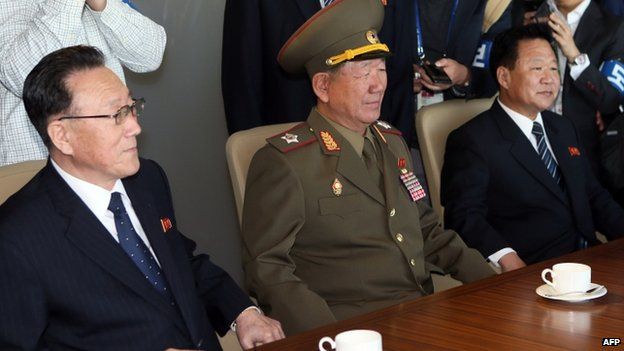North Koreans make surprise visit to South
- Published

Three senior North Korean officials are in South Korea for the closing ceremony of the Asian Games - a visit seen as a rare opportunity for high-level talks.
The North Korean team is led by Hwang Pyong-so, who is considered to be the second most important official after leader Kim Jong-un.
Mr Hwang is expected to meet South Korean Unification Minister Ryoo Kihl-jae and a senior security adviser.
The visit comes as speculation continues about the health of Mr Kim.
He has not been seen in public since 3 September. A recent official documentary showed him limping and being overweight.
Harsh rhetoric
The three North Korean officials arrived in the city of Incheon - the venue of the Asian Games.
They will take part in the closing ceremony of the major sporting event later on Saturday.
They are also expected to hold talks over lunch with Mr Ryoo and Defence Minister Kim Kwan-jin before returning home.
Mr Hwang is the top political officer at the Korean People's Army. The other two officials are Choe Ryong-hae and Kim Yang-gon - key members of the ruling Workers' Party.
The BBC's Stephen Evans in Seoul says the seniority of the team underlines the importance of the visit.
Despite that harsh rhetoric of recent years, the visit indicates a desire for economically-pressed North Korea to have closer relations with the South, our correspondent adds.
The visit has also caused speculation about Kim Jong-un, who has been absent from public view for a month.
What the closest members of his inner circle tell the South Korean government will be analysed to try to discern the health and views of their leader back in Pyongyang, our correspondent adds.
North Korea has been conducting missile and nuclear tests since six-party talks on its nuclear programme broke down in 2008.
The two Koreas are still technically at war since the 1950-53 war that ended in truce.
- Published23 September 2014
- Published11 September 2023
- Published19 July 2023